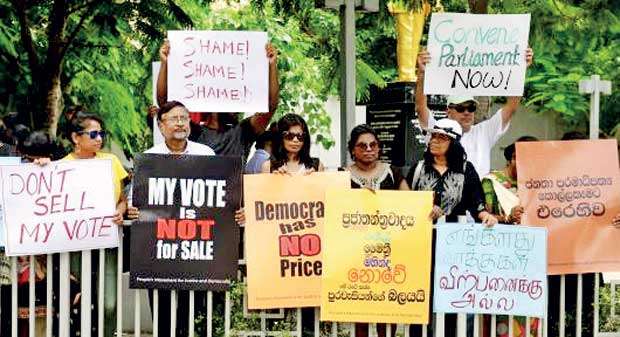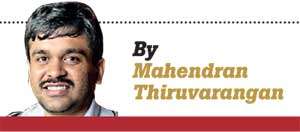Reply To:
Name - Reply Comment

 The changes that have happened in a dramatic manner at the helm of the state within the past two weeks or so have shaken our faith in the Constitution drastically. When I say “our,” I include all of us, those who occupy both the centers and the various peripheries of our polity. What we today describe as the constitutional crisis is an implosion of liberal democracy, one that is created by liberal democracy itself at the convergence of executive presidency, neoliberal policies and majoritarian nationalism. The implosion, without a progressive political, economic or reform agenda or alternative in place, reduces to an authoritarian order and may turn into fascism. If we do not act prudently by mobilizing ourselves to fight against this authoritarian turn, a right wing populism on the road to fascist take-over of the country may be the end game.
The changes that have happened in a dramatic manner at the helm of the state within the past two weeks or so have shaken our faith in the Constitution drastically. When I say “our,” I include all of us, those who occupy both the centers and the various peripheries of our polity. What we today describe as the constitutional crisis is an implosion of liberal democracy, one that is created by liberal democracy itself at the convergence of executive presidency, neoliberal policies and majoritarian nationalism. The implosion, without a progressive political, economic or reform agenda or alternative in place, reduces to an authoritarian order and may turn into fascism. If we do not act prudently by mobilizing ourselves to fight against this authoritarian turn, a right wing populism on the road to fascist take-over of the country may be the end game.
I take this moment of political crisis as an opportunity to ask a few questions about what aspects of our lives and experiences as citizen-subjects that have been threatened by the dastardly decisions made by the President over the past two weeks. Why has this issue drawn so much of local and international opprobrium in contrast to everyday poverty, unemployment, the widening income gap, the dispossession faced by communities on the margins, and the grievances of the women in the North who are searching for their loved ones made to disappear during the civil war, have been experiencing for countless number of decades? How has this event become an extra-ordinary development overshadowing the mundane trials and tribulations of the vast majority of the people?
Even as we feel the need to highlight why parliamentary democracy and constitutionalism are precious to us at this moment, I am pricked by the feeling that we have for long taken refuge in a comfortable shell that it created ignoring issues that undermine the everyday existence of thousands of this country’s citizens. Why has liberal democracy been a comfortable shell for some of us all these decades is a question that I want to ask today.
"The implosion, without a progressive political, economic or reform agenda or alternative in place, reduces to an authoritarian order and may turn into fascism"
This is not the first time we are facing an assault on the constitution. The constitution of our post-colonial state has been violated in various ways starting from the disenfranchisement of the Malaiyaha Tamils immediately after Independence. On the other hand, parliamentary democracy and liberal constitutionalism in post-colonial Sri Lanka has done little to alleviate the structural discrimination and dispossession that the working class populations, the poor, the ethnic and sexual minorities and women have been facing for decades. The freedoms it guaranteed, while having broadened the space for political action on some occasions as in after the regime change in January 2015, have simultaneously allowed the rich to become richer and the poor poorer and the expansion of capitalist agendas. With the entry of neoliberalism in the form of micro-finance companies, uneven development, increased financialization and privatization and land grab, even the minimal safeguards of liberal democracy that had ensured at least a semblance of dignity and stability in the lives of the peripheral populations started to wither away.
Likewise, the freedoms that liberal democracy claims to guarantee have not as yet led to a just solution to the national question. The constitution even criminalizes discourses of resistance and self-determination that challenge the territoriality and sovereignty of Sri Lanka. Liberal democracy has placed the marginalized and the minorities in a trap where choosing the lesser evil is the only option available to them. During elections, it has forced those who inhabit the peripheries to forego their urgent and cherished aspirations and limit the use value of their political strength to, at the maximum, enabling what they perceive as transitions. Its parliamentary version has been an enabling factor in propagating bigotry, feeding racism, and as the recent speech made by the President indicates, homophobia among Sri Lanka’s voting polity. At the conjuncture of neoliberalism, majoritarian nationalism and a political system where executive powers are concentrated in the hands of a single person, liberal democracy is no longer able hold itself together, giving way to the rise of populist and authoritarian forces.
"Liberal Democracy places the marginalized and minorities in a trap to choosing the lesser evil is the only option available to them"
Today some of our political leaders have chosen to flout the Constitution and parliamentary democracy not because they are buoyed by some new-found arrogance but they are confident that parliamentary democracy and its majoritarian logic will save them, as it has done on several occasions previously. President Sirisena appears to be banking on the assumption that the deep-rooted majoritarianism in our state and society, which Mahinda Rajapaksa represents and promotes, will keep him in power however much local activists and international press rebuke him for his failure to uphold the pledges he made in January 2015. The anti-West xenophobia garbed in theories of economic sovereignty may help raise the political fortunes of the more nationalistic segments of our self-serving political class.
The economic dispossession on the periphery and lack of organic development under the present regime have made it deeply unpopular in the rural South. The kind of image-building that Mahinda Rajapaksa carried out masterfully during his 9-year rule and afterwards as the savior of the rural Sinhala-Buddhist community and its ancient culture seems to override the neoliberal face of his previous regime at a time when the good governance regime is seen as a failure on the economic front by the population on the margins. The JVP’s inability to come up with an alternative economic program for the marginalized and the TNA’s exclusive focus on a political solution to the ethnic question also create the conditions for the rise of right-wing populism in the country. Whatever we do today as a way of challenging those who occupy positions of power constitutionally and unconstitutionally should be informed by a class-based, ethnicity-based and gender-based critique of liberal democracy. How liberal democracy has stratified our geography and the people into centers and peripheries and privileged and oppressed even as it granted some of us a few freedoms.
"Its Parliamentary version enables propagating of bigotry, feeding racism, and as the recent speech made by the President indicates, homophobia among Sri Lanka’s voting polity."
On the 4th of November, some women from the North who came to the Liberty Circle in Kollupitiya and joined the protestors demanding the restoration of democracy talked about the ways in which the freedoms that the regime change in 2015 brought about enabled them to continue their activism without fear and intimidation. They also spoke about white vans that might soon visit them. Yes, these freedoms matter to the people, not just the privileged but also many on the peripheries, including the North and East, who are trying to make the system work in a fair and just manner or dismantle it from within in their own inconspicuous ways. Yet we cannot limit our rallying cries to these freedoms alone. The current implosion of liberal democracy behooves us to bring to the front and center the various struggles taking place in different parts of this island.
As dusk fell on the Liberty Roundabout on the 4th of November, a group of protesters chanted about the Uma Oya struggle, about the importance of free education and free health care, about the future of the children in the North, about the return of lands to the communities that have historical claims over them, about de-militarization, and about social justice and ethnic equality. The comfort zones of Kollupitiya where the privileged cosmopolitan Sri Lankan had taken refuge for the past three years endorsing by his commissions and omissions the neoliberal economic policies of the good governance regime until he felt jolted by President Sirisena’s political volte-face cannot ignore these voices any longer.
The current moment is a time for reflection as much as action; it urges us to be both critical and self-critical. To think and act on these two levels simultaneously, taking into account the importance of the freedoms we have had for the past three years to all of us and their limits and insufficiencies, is what the crisis we are faced with today insists upon us. While we must safeguard the Constitution and Parliament from the authoritarian demagogues in power, we need to be mindful of how the Constitution and Parliament have repeatedly failed the minorities and marginalized sections of our polity. These processes are necessary today to arrest the country’s slide into fascism at present and in the long run. Abolishing executive presidency, introducing progressive economic policies, putting an end to the dispossession happening in the peripheries and addressing the ethnic polarization are some of the key goals that the country needs to work towards immediately with a genuine commitment.
Mahendran Thiruvarangan
Mahendran Thiruvarangan is attached to the Department of English, University of Peradeniya and a member of the Collective for Economic Democratization in Sri Lanka